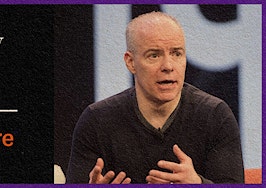Inman Connect New York delivers the perfect blend of outside-the-box thinkers, cutting-edge leaders, and hard-working, successful agents. Join us Jan. 24-26 for crucial content, education, and networking opportunities to help you thrive in today’s changing market. Register here.
The housing market is slumping and the stock market is in a ditch.
Interest rates just keep rising, and even an uptick in the overall economy doesn’t appear to be buoying up real estate much. These are tougher times than anything in the immediate past.
It was against that backdrop that Coldwell Banker gathered this week in Phoenix for its annual Gen Blue conference. The event drew thousands of agents and brokers from across the country and featured commentary from the venerable company’s top leadership — including CEO M. Ryan Gorman.
Gorman sat down with Inman after Gen Blue ended to talk about how it went and what he thinks of the market right now. He was ultimately frank, saying that the current shift is “significant,” even as he argued his own company’s experience gives it a position of strength.
During the conversation, Gorman also offered tips for agents who want to make it through the downturn, suggested that some big real estate companies won’t make it through the slump and even shared what he described as one of the best experiences of his life — which also happened to take place during Gen Blue.
What follows is a version of Gorman’s conversation with Inman that has been edited for length and clarity.
Inman: In the speech you gave at Gen Blue, one of the first things you hit on was this market shift. Talk to me about how substantial it is and how it compares to other shifts you’ve seen.
Gorman: Comparisons to prior market shifts can always be a little dangerous, especially because the most recent and most significant shifts were each pretty unique. So the last shift being COVID-related and the last major shift before that being the overall housing crisis. I don’t think what we’re seeing today is anything like either one of those. But I do think it’s still significant.
So today what’s happening of course is the Fed has taken significant action in a concerted attempt to slow down inflation. The Fed has pointed to housing renovations, home demand and home purchases and related imputed rents as drivers of inflation. So they’re really trying to slow down the overall housing market. And no surprise, they are.
So the significant increase in mortgage rates is certainly having an impact on unit volume of transactions and overall the pace of housing price appreciation as well, to a pretty significant degree.
How long do you think this is going to last?
It’s always difficult to peg a bottom or a top of a market. But I will say from a long-term perspective that I’m a big believer in housing. I do believe that in the U.S. housing market, especially, demand will remain strong. I believe we’ve underbuilt. Estimates vary as to precisely how many homes are needed to fully meet demand in the long term, but it’s in the millions. Everyone’s estimates are in the millions in terms of how many homes are needed.
That points to relatively strong medium- and long-term price holding and appreciation. So I’m a big believer in the medium and long term for housing for sure.
In terms of this particular time, I think it is very difficult for me or anyone else to time the Fed’s actions and various central bank actions that are targeted toward inflation. But when I look at the various prognosticators, there are relatively few people who believe it’s going to abate this year or even in the first half of next year.
You were just at Gen Blue with a lot of agents. Give me a sense of how folks feel right now. What’s the mood in the trenches?
In a few different respects, I think the confidence and appreciation for what they’re getting from Coldwell Banker, which is always the most important thing on my mind, is the highest I’ve ever seen. It’s incredibly high because we’re so incredibly focused on practicality. So we had thousands of agents and affiliates and broker-owners together at Gen Blue in Phoenix, and the question I asked everyone I saw was, ‘what specifically have you learned, heard or understood that’s going to cause you to change something in your business as soon as you get home?’
I ask those questions at every major meeting and conference we have and I have never gotten so many clear, precise, tactical and strategic answers as I got this time around. It gives them confidence to say, ‘the market might turn down but I don’t need to move with the market. Somebody is going to have the best year of their life this year and it might as well be me.’
How was the conference overall anyway?
It was fantastic.
The finale was [St. Jude Children’s Research Hospital] representative Paula Head, who came on stage to share her inspirational but also tragic tale of the loss of her daughter Carson. And there wasn’t a dry eye in the house including yours truly. She told a story about Carson raising money from her piggy bank. And I said, ‘hey Paula, throw up on the screen the QR code for donating directly to St. Jude and let’s see if we can donate $10,000,’ which was the goal we had set. And she corrected me and said the elementary school in Memphis was able to raise $15,000.
So I said, ‘alright, come on guys we can beat a bunch of kids. Let’s go for $15,000.’ And the system immediately went down as thousands of people hit the site and crashed it. So I panicked and assumed this was a little bit of a disaster and prepared to donate just whatever it took to hit the goal myself. But when the screen flashed back up, I think we were at $35,000. The crowd went nuts. And then $38,000. And then $52,000. And then $78,000. I think we closed out somewhere around $111,000. It was one of the best moments of my life honestly, just to see what Coldwell Banker can do in a matter of moments. That was probably just one of the coolest things I’ve ever seen.
Let me pivot to the stock market here. Coldwell Banker isn’t publicly traded, but your parent Anywhere is. And a lot of real estate companies have seen their share prices struggle in the last little while. Is that a concern? Does it matter?
Being publicly owned, we have every duty and obligation to our shareholders to try to optimize our valuation. So from that perspective, it’s certainly something in which we invest time and effort.
We are so big that we sort of cannot escape the macro environment. We can outgrow the market and pick up share, but if the overall macro environment is declining or increasing, that tends to have an impact on us. In terms of what we focus on, we double down on being efficient with our costs as we recommend every one of our agents and brokers do as well. We also focus on picking up share where other competitors just aren’t able to rise to the challenge in the same way.
In terms of our competitors, if they’re doing similar things I wouldn’t be concerned.
But there are a number who may not have a plan for good times, let alone a plan for bad times, that they can really execute. And I think their stock prices probably reflect that. They likely have concerns which might be quite valid. But we’re just in a different place where we can focus on accelerating the execution of our plans and picking up share in a tougher market.
The last few years have seen the rise of well-funded fast-growing companies like Compass, eXp and Opendoor. There’s been this dichotomy between the older established incumbents like Anywhere and its brands including Coldwell Banker and the upstarts. Do you see this current downturn tilting the market in favor of one side or another?
Fortunately, we just had our earnings call so I can speak a little more freely. Ryan Schneider on that earnings call said that we were pleased to see that we in fact were the fastest growing company in the entire industry in this most recent period of time.
In terms of whether that growth can not only continue but accelerate in a tougher market, I think that’s probably the case as a lot of agents and brokers look to attach themselves to a stronger value proposition with deeper experience in a time like this.
I think in a very hot market where money is very cheap, investors can put a lot of ideas to work. Place a lot of different bets. Today money has gotten very expensive and investors have gotten a lot more choiceful in their allocation of resources. I think you’re seeing that show up in the stock market but you’re also seeing it show up in venture funding — including for some folks in our sector who are finding it a lot tougher to raise money and are looking for what they might refer to as strategic alternatives in pretty short order.
Do you think the days in which an Opendoor or a Compass bursts onto the scene with investors’ backing is over for now?
The specific firms you referenced had business models, to my understanding, that were relatively capital-intensive. And may still be relatively capital-intensive. I think as the cost of capital increases dramatically, the likelihood of business models that have high capital-intensiveness and low ability to predict returns that are cash-based are going to be very much out of favor. I think that’s across sectors, not just in the real estate sector.
Do you think we’ll see a winnowing of the ranks of the big players in this downturn? Do you think we’ll emerge on the other side with companies having been acquired or companies having been shuttered?
Certainly. I think you’ve seen that already. And I think that will only accelerate as, I think, many firms that didn’t have much of a business model beyond raising money now try to search for a business model and, if they come up empty-handed, try to search for a partner or someone to bail them out.
I think that’s pretty typical across industries in various cycles. But we’re also a very highly fragmented industry. So every time there’s a downturn there’s a bit of a defragmentation. Still fragmented at the end of the day, but a lot of consolidation takes place in a downturn in our sector specifically.
Care to float any names?
Well, I think it is legitimately hard to predict. So I can have lots of thoughts, but some of the firms’ people ask me about with the greatest frequency, they have certain concerns about potential exit paths that would generate anger from investors and litigation that flows from that.
So it’s easier said than done for some of these firms that have found themselves upside down, having lost a lot of money from investors, to find a path to exit. So it’s a little tougher to predict in the very near term.
In the longer term I would say if you don’t have a durable business model, you’re not going to be in business for long.
I asked about the thinning of the ranks for big companies, but what about agents? Are we going to see agent ranks shrink in this downturn?
Typically when a market contracts, especially on the transaction side, shortly thereafter the next renewal cycle a lot of agents turn in their licenses. Typically agents who had zero to one transaction in the prior 12 months or 24 months oftentimes don’t renew their license. Those renewal cycles are every year in some states, every two years in others. You don’t really see the disappearance until those renewal cycles come up, because agents can maintain a license without transacting.
But it’s almost a certainty that the number of agents will decline in the coming year relative to where we are today.
That’s not to say that life will get easier for the agents who remain licensed unless they do the hard work of really focusing on growing their business, serving their clients, getting their name out there, prospecting like mad to make sure they’re growing even if the market around them is shrinking.
So I wouldn’t predict easy times for agents who want the market to come to them. But for those who do the work, I think they can still grow.













